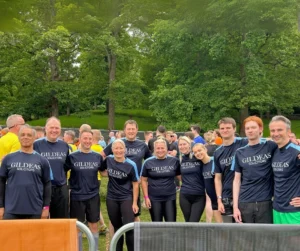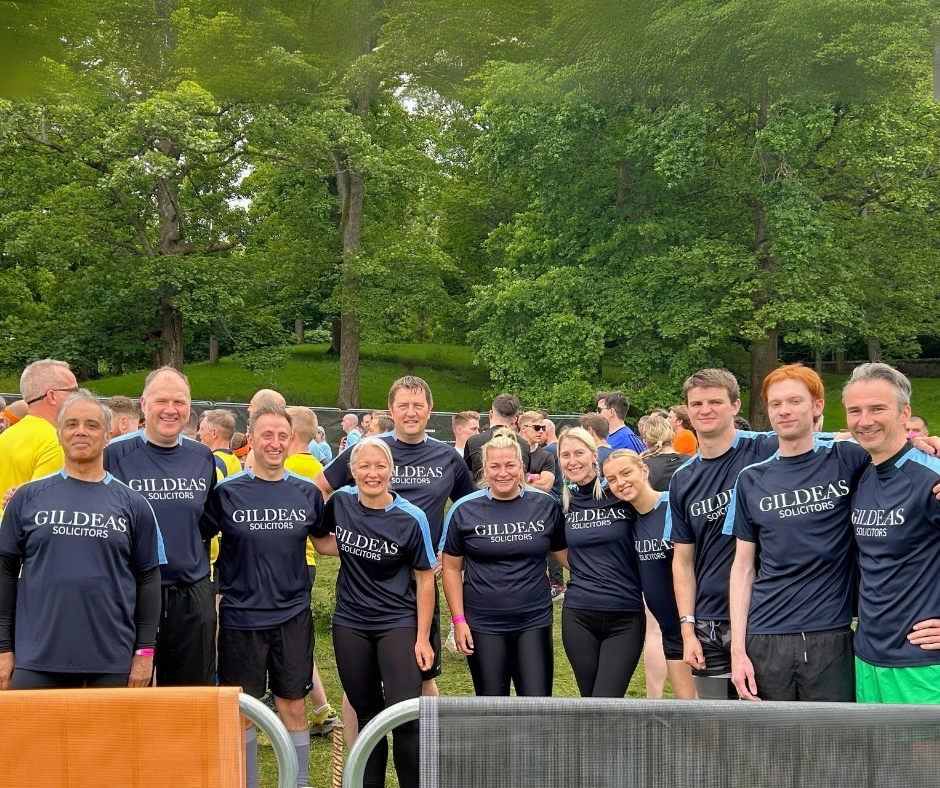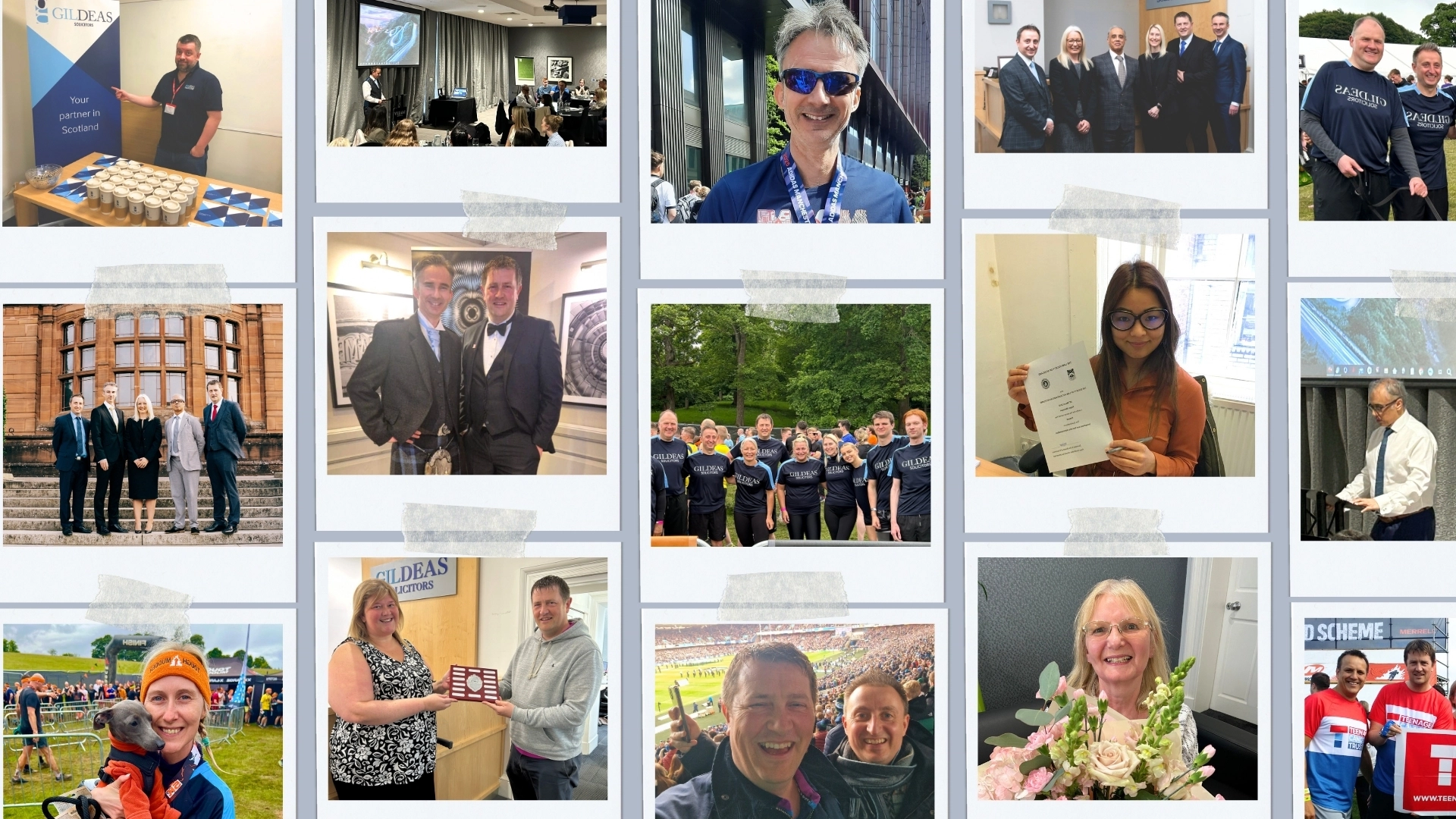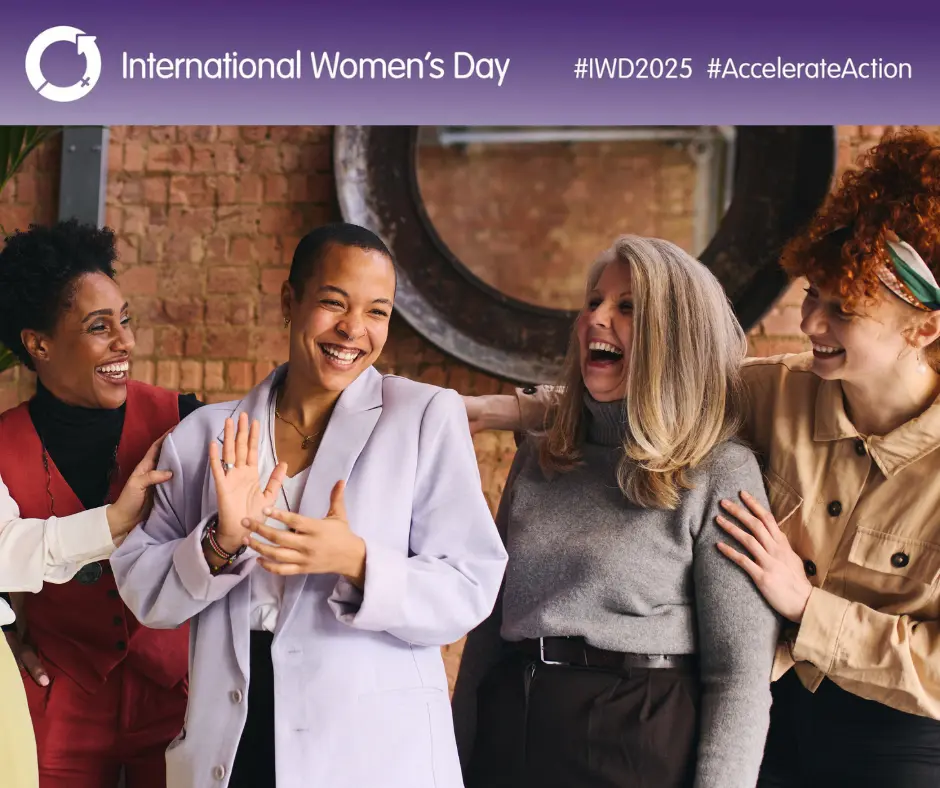News: What Labour's bold new road safety strategy means for you
- Home
- Archive by Category "News"
Share this article
Westminster has announced it’s first road safety strategy in over 10 years, targeting an ambitious 65% reduction in deaths and serious injuries on UK roads by 2035.
From mandatory eye tests for over 70s to a minimum learning period for new drivers, the changes are expected to be the most significant to road safety laws since 2006.
We take a closer look at the changes to motoring laws introduced within the strategy – and how it will affect Scottish drivers.
New laws as part of the Road Safety Strategy:
1. Mandatory eye tests for over 70s
This is one of the biggest changes Labour is looking to introduce, and one that campaign groups have pressed for in recent years.
If implemented after a consultation period, the change would see all motorists aged 70 needing to obtain a current eye examination and include it with their application to renew their licence every three years.
What do you need to do if this change affects you?
How the testing and renewal system will work exactly has yet to be announced but drivers over 70 will have to show they’ve passed the tests required to renew their licence.
2. Minimum period of learning for new drivers
The Government will look to introduce a three or six-month minimum period of learning for first time drivers.
The DfT says that ‘inexperience behind the wheel is costing lives’ as drivers aged 17-24 represent just six per cent of licence holders but are involved in 24 per cent of fatal and serious collisions.
What do you need to do if this change affects you?
If this change goes through drivers will need to show they have completed the set amount of learning. We don’t yet know how this will be checked, but it may be that driving instructors will be required to show how long students have been learning for.
3. Crackdown on illegal number plates
The growing number of illegal number plates will be targeted with new measures, with particular focus on eliminating ‘ghost’ plates designed to fool camera systems.
Ghost plates use a reflective coating that prevents them from being read by recognition cameras.
The Government has been warned that as many as one in 15 vehicles may carry plates designed to evade detection.
How will the new road safety strategy be introduced?
The government will look to publish a number of consultations aimed at affected groups, including drivers older than 70, new drivers, motorbike users, and a consultation on vehicle tech.
Spokespeople from the AA have stated this will predominately look at the EU GSR2 (General Safety Regulation 2) – a European law mandating advanced driver-assistance systems (ADAS) in new vehicles to reduce road deaths.
Further measures include bringing the drink-driving limit in England and Wales into line with Scotland’s, as well as tougher penalties for uninsured drivers and those without a valid MOT.
On the new strategy, Secretary of State for Transport Heidi Alexander, said:
‘Every life lost on our roads is a tragedy that devastates families and communities.
‘For too long, progress on road safety has stalled.
‘This strategy marks a turning point.
‘We are taking decisive action to make our roads safer for everyone, from new drivers taking their first lessons to older motorists wanting to maintain their independence.
‘The measures we are announcing today will save thousands of lives over the coming decade.’
Looking Ahead
If fully implemented, this new strategy could mark a meaningful step forward in reducing avoidable harm on UK roads. A stronger focus on older drivers eyesight, experience and enforcement reflects a growing understanding that safer roads rely on responsible driving as much as policy.
For Scottish motorists, some measures will feel familiar, while others may bring important changes. As consultations develop, clear guidance will be essential to ensure these reforms are effective.
We know that behind every statistic is a person and a family. Preventing injuries must remain the priority, but when accidents do happen, informed legal advice can make a real difference.
If you’ve been affected by a road traffic accident or have questions about your rights, we can help. Contact Gildeas Solicitors for a no-obligation chat today.
Claim smarter.
Get your FREE guide to personal injury claims!
Check out our related links:
Why You Shouldn’t Drive Without A Dash Cam
Bike Filtering: Legal, Risky, Or Just Misunderstood?
Gildeas Solicitors is a recognised law firm specialising in personal injury claims, supporting you throughout Scotland from our offices in Glasgow and Edinburgh. We’re passionate about what we do, whilst putting our clients’ interests first. That’s why we make personal injury personal.
Considering our services? Call our dedicated team today on 0141 331 6070.
More to explore
News: A Year of Growth and Gratitude at Gildeas Solicitors
- Home
- Archive by Category "News"
Share this article
As we move through the last month of 2025, we are reflecting on a remarkable and transformative year for our firm.
It’s been a year defined by progress, achievement and a deepening commitment to the people and communities we serve.
Strengthening our Legal Team
In 2025, we continued to invest in the strength and future of our team. In February, Fergus Thomson, Solicitor Advocate, was appointed as Director. This was a proud moment for the firm and a testament to Fergus’s expertise, leadership and dedication to clients.
In March, we celebrated a raft of well-earned promotions across the business. Several colleagues were promoted to Senior Paralegal, including Deonne Stirling, Nicola Bremner, Seonaidh Currie and Kirsty Hinds. Their talent, hard work and commitment to client care are key to the service we deliver every day.
We were also delighted to recognise a number of colleagues who reached an exceptional milestone this year. Several members of staff celebrated their ten-year anniversaries with Gildeas. Their loyalty and long-standing contribution have helped shape the firm we are today.
Fighting for the Injured Across Scotland
Throughout 2025, our solicitors secured millions in settlements for people injured through no fault of their own.
But our work is about far more than recovering financial compensation. We focus on helping clients rebuild their lives by arranging the right medical treatment, rehabilitation support and expert assistance from the earliest possible stage. Whether this involves physiotherapy, psychological care, specialist assessments or ongoing therapeutic input – our aim is always to help each client return to the position they were in before their accident, as fully and quickly as possible.
Every case represents a family facing uncertainty, a person in pain, or a life upended – and it remains our privilege to guide our clients through their most difficult moments.
Giving Back to the Community Who Supports Us

Our commitment to community work remained strong this year.
In June, a team from Gildeas took part in the Tough Mudder challenge to raise funds for Cardiac Risk in the Young, a charity carrying out vital work to reduce the number of young people who lose their lives to sudden cardiac conditions.
This cause was especially close to our hearts. Our fundraising was dedicated to the memory of Ashwin Bali, a young doctor who tragically passed away in 2024 from sudden cardiac arrest.
The team raised more than £6700 in his honour, and we are immensely grateful to everyone who supported us.
Looking Ahead
As we prepare for 2026, we do so with gratitude for the trust our clients have placed in us, pride in our team’s remarkable achievements, and excitement for the future at Gildeas.
We might have evolved, but our mission – protecting the injured, fighting for justice and supporting our community – remains the same.
Thank you for being part of our journey.
From all of us at Gildeas Solicitors, we wish you a Merry Christmas and a safe, healthy and optimistic New Year.
Contact Gildeas Solicitors for a no-obligation chat today.
Claim smarter.
Get your FREE guide to personal injury claims!
Check out our related links:
Meet the Team at Gildeas Solicitors
Gildeas Solicitors is a recognised law firm specialising in personal injury claims, supporting you throughout Scotland from our offices in Glasgow and Edinburgh. We’re passionate about what we do, whilst putting our clients’ interests first. That’s why we make personal injury personal.
Considering our services? Call our dedicated team today on 0141 331 6070.
More to explore
Gildeas Solicitors Celebrate Staff Long Service
- Home
- Archive by Category "News"
Share this article
We recently celebrated the landmark anniversaries of several employees who together have provided a combined 80 years of service to the firm.
At Gildeas, we’ve stayed firm in our belief of making personal injury personal. Key to that mission is the commitment, confidence, and hard work from our incredible staff who go above and beyond to support our clients.
To mark their anniversaries, we sat down with members from across the firm to reflect on their experiences. Read below to hear from Claims Handlers Rajan and Chelsea, Senior Paralegal and Assistant Team Leader Deonne, Head Cashier Rajani, Senior Claims Manager Danny, Director and Solicitor Advocate Fergus, and Director Emma.
How have things changed for you at Gildeas Solicitors since you first started?
Danny: In July 2015, Deonne, Emma, and I started within a couple of months of each other and the three of us made up the newly formed Gildeas Credit Hire Litigation unit. This eventually transformed into a personal injury litigation unit of 10 staff members which I’m still responsible for, amongst my other duties. My role has evolved in line with the business. I was initially hired as a credit hire team manager. My current role still covers those claims management responsibilities, although I’m also involved in ongoing change projects, together with IT development and support. This role is incredibly rewarding and affords me the opportunity to broaden my skillset, and help the business evolve and respond to an ever-changing and competitive market.
Rajan: I started 10 years ago in 2015, so my hair and waistline have certainly changed, but I’m proud of the firm and its achievements, particularly surviving covid as it felt like we got through it all together as a family.
Fergus: The team has grown quite a bit, but it still has the same family feel which impressed me when I started. The change to hybrid working with some time in the office and some working from home has been quite a difference, but I think it works well with the trusted staff we have.
Emma: My time at Gildeas has spanned most of my career. I started as an Assistant Solicitor, 1 year qualified and have progressed up to Director.
Chelsea: Well, I initially started in the First Response Unit (FRU), but I moved to [our sister firm] Fulton’s Solicitors for a short period in May 2022. I then realised my passion was in personal injury and returned in February 2023. I’ve since advanced in my career and began litigating on cases, which is challenging but rewarding. I really enjoy my role – especially when I can secure an effective settlement for our clients. Something that does come to mind is how much our technology has improved over the years. For example, when I was in FRU, we printed off all our files and they were allocated by hand – now we allocate them all digitally.
Rajani: Yes, since I first started, the firm has definitely evolved. We’ve moved towards more digital which has also made a huge difference in how we manage Cashroom.
Deonne: When I first started, I applied to be in First Response Unit. At the interview, the Directors suggested I take on a role in the Claims team as I have a law degree – which was initially a credit hire recovery team. Very quickly, I started on personal injury claims, then I was litigating, and within a couple of years, I was in a supporting role to my Team Leader. Since then, I’ve gained accreditation from the Law Society and now assist in running a team with one of our Directors. There has been a lot of change in 10 years, but I think the thing I’m most proud of is my own development.
Danny: Gildeas has evolved significantly over the last ten years, although the core values of the firm have always remained the same. The business has seen huge leaps forward in terms of how we apply technology in order to keep pace with the modern claims environment. These changes have been vital in ensuring that we continue to meet customer expectations along with our own high standards.
What is the best piece of advice you’ve received during your time at Gildeas?
Rajani: Always take the time to double-check – accuracy is key. In my role as Head Cashier, that advice has been especially valuable. It’s helped me stay focussed on precision and attention to details, which are so important when dealing with financial transactions or other daily Cashroom duties. It’ s a simple reminder, but it reflects the firm’s standards.
Fergus: Being told about six months ago that the main office printer which had been there many years had a built-in stapler I found life changing!
Chelsea: To always treat clients the way you would want to be treated and remember the impact the accident has had on them. Also being told to read correspondence thoroughly and pick up the phone to get a quicker and more detailed response. Finally, always ask for help – there are no stupid questions.
Deonne: The best advice I’ve received is to stop and take a step back. I think there’s an expectation sometimes to react immediately to an issue or change. Sometimes, there’s merit in taking a breather, looking at the bigger picture, and then deciding how to move forward.
Rajan: For me, it’s that if you don’t ask, you don’t get!
And finally, do you have any memorable moments through the years? Maybe a particular case – or that trip to Ibiza!
Rajani: Yes, there have definitely been a few! One of my most memorable moments was being promoted to Head Cashier. It was a really proud moment for me – not just because of the new title, but because it felt like a real recognition of the hard work and trust I’d built up over time. It gave me a boost of confidence and made me feel more invested in the firm. Another memorable moment was the Ibiza trip – such a brilliant experience! It was great to spend time with everyone outside of work, and it really brought the team together. Definitely one of those trips that sticks with you forever!
Chelsea: It has to be the trip to Ibiza!
Emma: That trip to Ibiza was pretty amazing! Being appointed as a Director a couple of weeks before my 40th birthday was an especially proud moment for myself and my close family.
Danny: That trip to Ibiza was definitely a high point and was once of the best holiday weekends I have had. More recently, the staff conference in 2024 was a huge success as it offered the staff the opportunity to come together and celebrate the success of the business after what had been a very challenging year for the firm.
Deonne: The most memorable moments for me have been all of the times we’re able to down tools and let our hair down. It’s always good to be celebrating someone outside of office hours, whether it’s been baby showers, weddings, or special birthdays. Christmas nights are always a good time – the bus home the next day, not so much!
Rajan: For me, I’ve enjoyed supporting colleagues at charity events such as Tough Mudder – particularly the post event BBQs and drinks to celebrate. Christmas parties are usually memorable – in that I don’t quite remember them!
Fergus: It is always satisfying when I have achieved settlements where clients are awarded life changing sums of money for the very significant injuries they have suffered. Leading the team of a sing song through the beachside streets of Ibiza was great fun and not something I would have experienced with any other law firm. The team all pulling together for the recent Tough Mudder fund raising effort for such an important cause so close to our hearts was also a real highlight.
Thank you all for taking the time to share your stories, and for setting such a fantastic example for us all. Here’s to the next 80 years!
Gildeas Solicitors is a recognised law firm specialising in personal injury claims, supporting you throughout Scotland from our offices in Glasgow and Edinburgh. We’re passionate about what we do, whilst putting our clients’ interests first. That’s why we make personal injury personal.
Considering our services? Call our dedicated team today on 0141 331 6070.
More Recent News
Tough Mudder 2025: Gildeas Brings the Fight in Memory of Dr Ashwin Bali
Share this article
- Home
- Archive by Category "News"

From Courtrooms to Ice Baths: Gildeas Takes On Tough Mudder for CRY
The team at Gildeas Solicitors traded their suits for sports gear this weekend as they took on one of the UK’s toughest endurance events – Tough Mudder Edinburgh – in support of Cardiac Risk in the Young (CRY).
On Saturday 7th June 2025, a determined group from our Glasgow and Edinburgh offices powered through 5 kilometres of mud, grit, and relentless obstacles including eight-foot walls, ice baths and the notorious cage crawl.
Why? To raise vital funds and awareness for a cause that hits incredibly close to home.
All For A Cause That Matters
We were proud to take on this challenge in loving memory of Dr Ashwin Bali, a remarkable young man from Glasgow who tragically passed away in March 2024 at just 26 years old due to Sudden Arrhythmic Death Syndrome (SADS). Ashwin was a much-loved Foundation Year 3 doctor working in Yorkshire, remembered for his radiant smile, his joy for life and the compassion he brought to everyone around him.
Following his passing, Ashwin’s family and friends raised over £21,000 for CRY, a charity dedicated to preventing young sudden cardiac deaths through screening, awareness and research. At Gildeas, we are proud to continue this mission by supporting CRY and helping to fund vital cardiac screening facilities across Scotland.
Not Your Average Legal Challenge
Taking part in Tough Mudder was no walk in the park. It tested every ounce of stamina and teamwork our solicitors had – but it was nothing compared to the daily challenges faced by families affected by sudden cardiac death. Every muddy step we took was in the hope of saving lives and sparing others from such devastating loss.
A Remarkable Effort
At time of publication, we have raised over £5.4k for CRY. The public response has been incredible, with local news, Glasgow Live covering the event.
We are deeply grateful to everyone who supported our fundraising efforts and can’t thank you enough.
Your donations help CRY continue its life-saving work, giving young people across the country the chance to be screened and protected.
Want to learn more about Ashwin’s story or support CRY’s mission? Visit Dr Ashwin Bali’s tribute page or go to www.c-r-y.org.uk to see how you can make a difference.
Together, we got muddy for a meaningful cause – and we’d do it again in a heartbeat.
Gildeas Solicitors is a recognised law firm specialising in personal injury claims, supporting you throughout Scotland from our offices in Glasgow and Edinburgh. We’re passionate about what we do, whilst putting our clients’ interests first. That’s why we make personal injury personal.
Considering our services? Call our dedicated team today on 0141 331 6070.
More to explore
News: Staff Changes at Gildeas Solicitors
On behalf of the Board of Directors, we are pleased to announce a series of promotions at Gildeas Solicitors.
With effect from March, Deonne Stirling, Nicola Bremner, Seonaidh Currie, and Kirsty Hinds have all been promoted to Senior Paralegal within our Glasgow office.
Their promotions are testament to their development, commitment and dedication to the hard work they have put in with us.
We wish them well as they continue in this next stage of their careers.
Thanks go to all of those promoted for the tremendous work they do every day to the benefit of our clients.
Gildeas Solicitors is a recognised law firm specialising in personal injury claims, supporting you throughout Scotland from our offices in Glasgow and Edinburgh. We’re passionate about what we do, whilst putting our clients’ interests first. That’s why we make personal injury personal.
Considering our services? Call our dedicated New Claims team on 0141 331 6070.
International Women’s Day 2025: In Conversation With Lindsay Hare and Emma Thomson Part 2
In 1919, The Sex Disqualification (Removal) Act was enacted, permitting women to practice law in Scotland, and in the same year, Madge Easton Anderson became the first woman to do so. For International Women’s Day 2025, we want to highlight and celebrate the women who followed in her footsteps. Read on as we interviewed Lindsay Hare and Emma Thomson, Gildeas Directors and personal injury specialists.
In the second part of our interview, they reflect on what International Women’s Day 2025 means to them, and discuss how they navigate the challenges women face throughout the legal profession today.
Q: What has been one of the highlights of your career so far?
ET: There will always cases where you build a memorable relationship with the client, or it may be a particularly difficult fight with the other side! But for me, it’s being certified as trauma-informed. I completed this course only the second year it ran. I am now seeing an awareness of this across the whole legal and justice sector. As I completed the course quite early on, I felt I was ahead of the game.
LH: Mine is coming back after having my son. Getting back and showing you can still do it. It’s tough when your kids are young. I’m coming out of the younger stage – my son is 11 now, I’m out of the tough bit. But trying to manage it and balance it all, it’s not an easy job. You can be running from one car crash to the next, literally! [Laughs] But that’s one of my highlights, throwing myself back into work and still achieving what I wanted to achieve professionally whilst trying to achieve it personally as well.
I’d say I achieve a work-life balance, that’s important for me. My career is hugely important to me – I’m very driven and ambitious, I want to do well – but so is my family. My career can be flexible, my family can’t be. So moulding our policies and moulding the shape of this firm to understand that. Work is work, but we can be flexible. I’m a parent 100% of the time – there’s no flexibility in that for me.
So, that’s where I’m proudest in terms of coming back and working through that. As well, I had some other time out because I had breast cancer so even coming back after that and getting your head around that. I think where our firm is improving is supporting women – moulding the policies, moulding the ideas of the firm, how we strive to run this place – that’s my highlight.
Q: You mentioned the support of the other Directors, and it helps that we’re a smaller firm. When you’re talking about the balance between family and career, would that be more difficult for someone in a larger firm?
LH: I could only really speak for what we do and how we work. A lot of big firms are probably clicking on they’re going to lose their brilliant female lawyers because they can’t do the hours that they were traditionally expected to, or at the time they want them done. They’re getting more alert to that. In a bigger firm, there’s probably more people that can help, but there are more traditional-thinking firms.
ET: I can only talk about my own experience, but there can be more flexibility in a smaller firm, or you can stand out more. You’re not a number. We know our staff very well, and that’s important. There’s a lot of milestones that we’ve gone through and celebrated with our staff – weddings, birthdays, etc. You may be more of a number in a larger firm, or it’s a set of inflexible rules.
LH: We look at circumstances and speak to people, try and work with them. I’d like to think that goes on everywhere. We can be open to discussion with people, it’s the best way to make things work. Obviously, we’ve got the firm’s interests to look after – it’s not a case of you work half the time and get paid full-time, for instance. But coming up with practical solutions we can make work. We have a degree of flexibility because we know our staff – they’re people with real lives and real problems, and we’re here to support them the best we can.
Q: What has been the most impactful change for women that you’ve seen across your career in law?
LH: The increased flexibility the last few years has brought. Covid was hellish, but I suppose the benefit coming out of it was to let people see that flexible working can work. There’s a balance for us – a lot of our staff work hybrid unless they’re junior or in support roles. But that’s got to help, it helps me. For instance, on days where my son’s got to be somewhere before 6.00pm – I can’t finish here and get home, dinner sorted and back out – so I work at home. I like that I can get him where he needs to be. So, the increase in flexible working is one of the biggest changes that I’ve seen within this firm, and I suspect it’s been across the board.
ET: Across the board, yes. Some firms – depending on what area you practice – may have realised you don’t necessarily need to do the “core” 9 – 5 hours. That’s been quite a change, it’s opened positions up. If you’re doing a litigation role and you need to be in court between those hours, there has to be some availability – but depending on the business structure, it might open avenues. Say, “I want to put my kids to bed and then do a bit of work later on”. The flexibility has had a big impact. I’m not sure that’s specific to law?
LH: I think law was one of the areas that wasn’t particularly flexible, it was previously a very traditional working pattern. Other areas were ahead of the times on that. Law firms were a bit stuck in their ways, especially smaller firms – 9 until 5, Monday to Friday, you’ve got to be by your phone.
ET: And no four-day working or flexibility.
LH: Certainly, over the last few years as a firm, we’ve seen an increase in part-time staff. We’ve got many female staff who’ve gone off, had kids, and want part-time hours and we want to keep them because they’re good at their jobs! [Laughs] They might as well be here and do their job well for three days as opposed to losing them. We’ve got folk that start early, finish early, start later, or they’ll adjust their hours a bit if they’re at home. It is across the board, but law was a bit stuck in its ways.
ET: Particularly, I think if you’re a solicitor. You might have had flexibility if your role was support staff, but I think if you were a solicitor or a Partner, there just wasn’t any of that flexibility.
LH: I think IT has made a big difference – it’s got better, that’s been a huge change for law firms. When I started, everybody just came into paper files. Gildeas always used a case management system, but a lot of firms have only started to in the last 5 to 10 years. You were coming into bits of paper everywhere and you couldn’t take it home – so you were really stuck. So, there’s a lot more flexibility now. Firms are run more efficiently. That’s got to be a benefit – as I said, it helps me because I have kids. But everybody wants a bit more time in the house in the evening or has hobbies and things they want to do.
ET: Remember before covid when you were like, “I’ve got a delivery, but I can’t be in for that delivery because I work Monday to Friday, I leave the house at 8 and I’m not back until after 6 o’clock,” – it’s things like that. Just knowing the flexibility is there.
LH: That’s one of the most impactful changes. Your work can be flexible, but your family can’t be.
Q: If there are firms that are still stuck in their ways as you say, what do you think could encourage that flexibility? Do you think it’d be a case of more women coming into senior positions?
LH: I think that’d probably help.
ET: An understanding – if you’ve walked in someone’s shoes, you’re going to have a better understanding. I suppose legislative changes as well – there’s suggestions of flexible working requests from the start of your employment as opposed to you having to be there for so long. Although that might be enforced upon them, rather than change because they want change.
LH: If people could see that you’re at risk of losing good people – you know, because you can’t be a bit flexible – then it’s so short-sighted. People need to open their eyes.
ET: Recruitment is so hard.
LH: And expensive! For firms to say, “No, that’s not what we do,” – it’s a short-sighted approach. Your staff are your firm, they’re the most valuable asset you’ll have in a firm. If you’ve got good staff, losing them over something silly like that – I mean, women do tend to take on a bigger responsibility with children, just in our nature – because we’ve had them, we don’t like to give up the control! [Laughs] But if you’re not willing to accommodate that to a degree, I think it’s short-sighted. You need to be open.
ET: It’s important as well if someone’s working flexible hours or part-time hours, they can still climb up the career ladder. As long as they’re doing the work to be able to do that. It can’t be a case of, “You’ve been in work three days a week, you can’t be a Partner.” That’s important.
LH: Hugely. That shouldn’t be any barrier. If someone’s good, then they’re good. It doesn’t matter how many days they’re here, they’re still good.
ET: I think we’re clear – to be doing this role, you’ve got to be ambitious and driven. That’s important to allow people to grow. Family life is important, irrespective of whether you’ve got kids or not, we all like to spend time with our families.
LH: That’s what balance is. I completely agree, that’s a huge thing. You still have to let people grow, even if they’re not full-time. Although we don’t have many solicitors in that situation at the minute.
ET: We probably will do at some stage – we have a number of young, female solicitors.
LH: And they can’t be restricted.
Q: Do you think there are any traditional ideas across the industry still lingering on?
ET: Absolutely! [Both laugh]
LH: It’s hard.
ET: I suppose – I’m not saying we don’t have any traditional ideas, but I think there might be more across some of the larger firms.
Q: You mentioned, as you go up – Advocates, and stuff like that – the scale is more favoured in terms of men rather than women?
ET: Yes. If you’re going to the Bar, you need to give up a huge amount of time to train to do that, and it’s a huge financial burden. You’re not getting paid for the period of time that you’re training or building up your practice. That’s a massive thing if you’ve got financial commitments or kids. Sometimes, as an Advocate, you get instructed at the last minute. That doesn’t always work out with a family timetable. You can’t drop everything, for instance “Never mind picking the kids up from school today! I’ve got a brief to look at.”
LH: It’s the stability, isn’t it? Income. If you’ve got family to consider, that becomes a much more difficult game to play. I’m pretty sure there will still be very traditional people within the industry. We’re lucky, we don’t hugely have it [at Gildeas]. It’s hard for us to fully recognise, but I’m pretty sure there will be very male-dominated firms.
ET: I think it depends on what the nature of your practice is. If you’re for example, a family lawyer, there might be a bit more understanding of your family situation. Whereas maybe if you work in a corporate firm and you’re looking at mergers at 11 o’clock at night – there might not be as much of an understanding. It might be a bit more traditional.
LH: I know, and there will be people who just think that people should be in the office 24/7, 10 hours a day – where you’re not doing the job properly unless you’re there.
Q: Some people run their business differently?
LH: Yes.
ET: Over the last couple of years, there’s been lots of stories about NQ [newly qualified] positions down south and their salaries. There’s been a grab for NQ positions in London. The salaries are in excess of £100,000 – I suspect someone’s not paying you £100,000 so that you can have a 9-5 job! They’re going to want their pound of flesh! [Laughs] I get it’s that balance of having to live – you’ve got student debt you want to pay off, you want to get on the property ladder, etc. But you don’t have quite as good of a work/life balance if you’re getting paid a salary like that early on. And I wonder – how many people move out of that massive salary bracket?
LH: Where do you go from there?
ET: Are you stuck at that starting position for the rest of your career, or quite a bit of your career? I suspect you’re quite chained to the desk.
LH: I agree. There’ll be a lot of that still goes on within a lot of firms.
Q: The theme for IWD this year is “Accelerate Action”. What action would you like to see happen in the legal industry to continue to make progress?
ET: I suspect there’s a massive gender pay gap still, and disparities between numbers of men and women in senior roles. I don’t know whether it’s a timing thing. There are now more women coming into the profession. We might find in 10 – 15 years, there are more women in senior positions. But the gender pay gap I think is still an issue. Part of this is about women knowing their worth and negotiate their worth, although I suspect statistics will show an inequality still exists.
LH: It’s recognising and promoting the talented women that we have. Getting people into the profession isn’t where the issue lies, it’s that they continue through the profession. It’s really important that we push for flexible working environments and accommodate people, where we can, to make sure we don’t lose our good staff, and they don’t get disheartened and disengaged from the profession. That’s what happens a lot. People come back after maternity, there have been changes while they have been off, or they come back part-time and feel as if they’re getting overlooked for things. They consider, “Oh, I can’t go for that job just now because I’ve got young kids, it’s just too much for me”. Then they disengage and we lose that talent stream. It’s so important that we create as flexible a working environment as possible. We do what we can with the job we have to do, you still need to get your job done at the end of the day – but we make sure we don’t lose the gulf of talent. We push for a good working environment.
ET: We’ve had a couple of discussions recently, on a separate note that different people bring different strengths. Being a partner is not all about fee earnings. You can’t be saying, “You only bring in X amount because you only work 3 days a week, so you’re not worth a promotion.” Different people bring different assets and skills to the job and that’s important to look at.
LH: I don’t know if it’s as common now, but in the past, there was this idea that any woman that wanted to be a Partner were total b*tches to work for because they had to work so hard and fight to get where they are. That that was the way you’d exert your management position – but I don’t think that takes you anywhere.
ET: Absolutely.
LH: My idea about managing people is – I manage the way I’d like to be managed. I don’t ask my staff to do anything I won’t do. I don’t ask them to work crazy hours unless it’s something that really needs done there and then. And even then – I would see if I can do it myself! So, I just don’t think the idea of super b*tchy women running the place – we need to get away from that, it’s a dangerous stereotype.
Q: Do you think that’s quite pervasive, or do you think it’s getting better?
ET: It’s getting better.
LH: I think it’s getting better. I hope so. I hope that’s not what people think of us!
ET: I think there are some female Partners in the profession that do have a reputation for being like that.
LH: It’s probably because of what and how they had to fight for their position. I’d like to think that the path to Partnership, or management is a smoother one now.
Q: Do you think it’s a fine line that women have to walk between being perceived as a b*tch? That men are allowed to be a boss all of the time, whereas women are seen as a b*tch if they’re assertive? Is that still true?
LH: Yes. There is a certain degree of that. I think you even hear it with young kids, young girls – “Oh, she’s bossy.”
ET: When she’s just being confident.
Q: You both have to navigate many relationships – clients, third parties, if you’re litigating – going to court etc. Navigating that must be interesting considering there are certain rules you have to follow. So, would you say for female litigators that that’s a different ball game, considering you might be perceived differently to men? Or do you think it’s the same?
LH: There are some. You do encounter difficult clients look down their nose slightly.
ET: When you’re female?
LH: I mean, I got called a ‘daft lassie’ recently. But that’s few and far between – that’s a client, that’s their issue and not mine. The strength comes from experience and age. I could see why younger people would struggle with that.
ET: Yes, earlier on in your career – what you will tell a client, and what a male colleague tells a client – they don’t quite believe you. I generally treat my opposite how I’d like to be treated. It’s too much energy to be difficult all the time! [Laughs]
LH: I don’t overthink it.
ET: It’s too much energy.
LH: You do encounter prejudice, absolutely. I had a male consultant once – when I began signing off my emails as ‘Director’, he emailed me back as ‘Mr’ – because Lindsay can be a men’s name, the assumption was made that I’m a man. Now I’m assuming that’s because it read ‘Director’. I actually ended up emailing him back, because he did it about 5 times. I emailed back saying, just so you know I’m female. That’s just gender bias – he probably didn’t realise he’s got, but – he has! [Laughs] But you do encounter it with some clients. As we get older and more experienced, if someone says that to me – I’m ready for them now! [Laughs] That comes with knowledge and experience, you might not be able to do that fresh from university. It’s easier for us as we’ve been doing it for longer.
LH: I suspect you are less likely to see that with a man. His clients would be less likely to say that. I think that comes from the “daft lassie” sentiment.
ET: At least your client called you young though! [Laughs] But earlier on in your career, you do find that what you tell someone and what your male colleague tells them – they’ll believe them without a doubt. But they question you sometimes.
LH: Hopefully that’ll get better.
This interview was compiled by Samantha Upton, Marketing Manager at Gildeas Solicitors.
Gildeas Solicitors is a recognised law firm specialising in personal injury claims, supporting you throughout Scotland from our offices in Glasgow and Edinburgh. We’re passionate about what we do, whilst putting our clients’ interests first. That’s why we make personal injury personal.
Considering our services? Call our dedicated New Claims team on 0141 331 6070.
International Women’s Day 2025: In Conversation With Lindsay Hare and Emma Thomson
In 1919, The Sex Disqualification (Removal) Act was enacted, permitting women to practice law in Scotland, and in the same year, Madge Easton Anderson became the first woman to do so. For International Women’s Day 2025, we want to highlight and celebrate the women who followed in her footsteps. Read on as we interviewed Lindsay Hare and Emma Thomson, Gildeas Directors and personal injury specialists.
In the first part of our interview, they reflect on the highlights of their careers in personal injury law and offer advice to young people embarking on a legal career today.
Q: What led you to a legal career?
LH: Well, I had good results at school, and that’s pretty much what you fell into! I went straight from school to do my LLB at Strathclyde. Initially, I wanted to do medicine and then decided that I didn’t actually like blood very much! So I decided to do law instead. I’d applied for medicine then had to phone up the Law School at Strathclyde to ask if they’d consider my application, and they did. So, I just kind of fell into it.
ET: Slightly different for me, I did a BA in Business Law before I did my LLB. I preferred the legal modules, enjoyed formulating two sides of an argument or a story and decided to do my LLB afterwards.
Q: Who or what inspired you as a young lawyer?
LH: I was laughing when you asked this because I don’t think I can say Ally McBeal! I don’t think anyone will remember who she is! [Both laughing]
ET: Mine doesn’t necessarily relate to IWD, but my dad. My attention to detail comes from him. He is very hard-working. Neither of my parents went to university. My dad is very much – “If you’re going to do something, do it right.” Sometimes, I can’t switch my brain off until I’ve finished doing the task i’m working.
LH: For me, it’s the same – I was one of the first in my family to go to university, so I’m quite driven to do the best I can do and whatever I apply my mind to. We were brought up like that as well. I only had my dad, he continued to work after I lost my mum. He was very motivated at work, and he didn’t go to university either. He worked through the ranks of his job, and that’s the footsteps that we followed in. It’s work ethic.
Emma and I are probably quite similar – when I got into university, it was quite competitive. You were driven to be the best you could be, and certainly for me doing my Diploma, it went on grades for who got funded etc. It instilled that work ethic in me from an early stage of my career. I trained at Gildeas, and I was the only female Trainee when I started. If you want to do well, you have to work hard. When I came here, it was a much smaller firm. If you want to make a difference in a small firm, you need to pull your weight.
ET: I trained with a small firm as well and it was the same, you absolutely have to pull your weight. The law degree is quite competitive to get into, getting a place on Diploma is super competitive and is getting a Traineeship. Every year there can be peaks and troughs. For instance – the year before me, there were a lot of people who ended up working in the insurance industry because they couldn’t get Traineeships. It’s super, competitive.
LH: It’s hard work, you just need to be prepared to put the work in. I guess that’s what inspired us.
Q: Off the back of that, did you receive any advice early in your career which has stuck with you?
Both: Failing to prepare is preparing to fail! [Both laugh]
LH: We’re laughing at that, but there isn’t a truer statement.
ET: For me, I got a bit of advice – is it braver to admit you have made a mistake than to continue on a path that is not right for you.
LH: For the young staff, what I try and instil in the Trainees is – this is your Traineeship. You need to grab it with both hands. I’m not asking them to be cut-throat and outdo each other, it’s not about that. But it’s about applying yourself and absolutely pushing yourself to work as hard as you can and do as well as you can do. Really push yourself and don’t be scared to ask questions – if you don’t know an answer, that’s okay. But please don’t come to me without having tried to figure it out. That’s the approach I would take with anybody coming into the profession – they should be prepared to work hard, prepared to try and figure it out.
ET: You’re there for a reason.
LH: I guess that’s the advice that’s stuck with me because that’s the way I would like the Trainees to see their Traineeship – it’s their opportunity to grab it and push themselves on.
Q: What do you think are some of the barriers for young women in the legal industry today, and what advice would you give them?
LH: I think the statistics for women coming into law are higher than they’ve ever been. I don’t think it’s a barrier getting into the profession so much. It’s other areas of the profession where women struggle to make the same strides. If you walked into a university, the law classes would probably be predominantly female now. I think it was about 50/50 when I went to university, the balance is more in our favour now. But as they come through their careers, they have to be willing to cheerleader themselves. I think sometimes men are bolder about things like that.
I think some women, it’s just our nature to take a step back – and you need to be cheerleading yourselves. You need to be pushing. There’re obviously much deeper issues about if you go off on maternity and things like that, and how you come back – do people who work part-time get the same opportunities? How do you make those opportunities equal? So that’s an issue as you go through your career. But for younger lawyers – don’t be scared.
ET: Know your worth. Absolutely know your worth and fight for your worth. It’s not about what another person is doing, it’s about what you’re doing. And I think that’s it – as Lindsay said, be your own cheerleader.
LH: Yeah, don’t worry about other people, worry about yourself. I say that to my son all the time – life isn’t a competition. The only person you’re competing with is yourself, be the best you can be. That doesn’t matter if you’re not as good as the person next to you, or even if you’re better than the person next to you – as long as you’re being the best you can be, that’ll be recognised. That comes from hard work.
ET: My mum would give me that advice when I was younger, whereas my dad would advise – “If you’re going to do it, do it right.” My mum was very much like, “All you can do is do your best.” Going back to what Lindsay said, maybe when we started it was 50/50 split. I’m pretty sure during my time at Gildeas, the statistics issued from the Law Society was there were more women registering with practising certificates.
Q: Do you think there’s a reason why it’s tipped now?
LH: It’s an academic career. I think girls do slightly better at school, you tend to find girls are slightly more mature at school age. I haven’t seen the statistics on it though. I think where the issues lie within the profession are further up. The number of Partners or Directors that are female has always fallen behind the number of women in the profession overall. I think the statistics at the Bar and the Bench as well.
Q: What was it like for you to be promoted to Directors?
LH: I mean, I was the first female. So, it was quite a proud moment! I like to think that by doing that, you pave the way for others behind you. I was delighted when Emma showed an interest too, that I could help her in any way that I can. I was particularly proud because I’d been off on maternity, so I had to balance family life as well as work life. To be able to come back and still step into that role without being hindered – it is a bigger challenge coming back after being off for over a year. So, getting back and getting into that role, I was hugely proud. I’ve got a very supportive family, and the Board couldn’t be more supportive. They are very family-driven as well, so we’re lucky here for that – very lucky.
ET: For me too. I had a personal ambition of wanting to be Director before I turned 40. I was delighted when I was appointed weeks beforehand. I stared my traineeship later than some of my peers I didn’t go straight from school to complete my LLB. I did my law degree part-time and worked full-time, so it took me longer to do it, and I did my Diploma whilst I was working also. My appointment was an achievement personally as well as professionally. And it was great to make my parents proud, my dad was delighted. The hard work paid off. I’m really pleased to join Lindsay and be the second female on the Board. Hopefully we can bring a different perspective to management.
I do think that the Board is very supportive. For me, I don’t have a family, but they are supportive. Family time is important even if you don’t have kids – juggling family commitments is important.
LH: I think it’s important too having female leaders. We have talked about young staff but we have women at the other end of the spectrum, things like the menopause and managing people through that – it really does help to have a female perspective on the Board for stuff like that. We’ve had a few members of staff we’ve supported through it, and I know that they felt more comfortable coming to me about it. People generally feel more comfortable discussing issues with somebody who’s either experienced it, or going to experience it. I think we always take a slightly different approach to HR or personnel issues – I guess because by human nature, we see it from a slightly different perspective.
Q: That lens has an influence on your leadership?
LH: Yes, so I think it’s a really good balance to have both perspectives.
ET: Of course it is. We have both male and female staff, it’s good to have leadership in place for that.
LH: A lot of our trainees just now are female, I think it’s good for them to see that they can achieve this. The path is there for them. We have a lot of really bright young lawyers in here, really bright. If we can do anything to keep them here and they can see that they can achieve what we’re doing, we would be absolutely delighted.
ET: I think you’re right there. I had a conversation with one of our staff members about that recently, their career and how you progress your career. Being able to say, “Well, I joined here and then I went from Solicitor to Associate, then Senior Associate, then Director.” – it’s good for them to see there is a pathway. [Motions to LH] It’s good as well that you’ve got a family, and you can say you can have both, the balance is there.
Follow for part 2 when we reflect on #AccelerateAction, the theme for this year’s International Women’s Day 2025, and discuss the challenges women face navigating the legal profession today.
This interview was compiled by Samantha Upton, Marketing Manager at Gildeas Solicitors.
Gildeas Solicitors is a recognised law firm specialising in personal injury claims, supporting you throughout Scotland from our offices in Glasgow and Edinburgh. We’re passionate about what we do, whilst putting our clients’ interests first. That’s why we make personal injury personal.
Considering our services? Call our dedicated New Claims team on 0141 331 6070.
News: Fergus Thomson appointed new Gildeas Director
ANNOUNCEMENT: NEW GILDEAS DIRECTOR
On behalf of the Board of Directors, we are pleased to announce the appointment of Fergus Thomson to the position of Director, Gildeas Solicitors, with immediate effect.
Joining Gildeas in 2015, 2025 marks his ten-year anniversary at the firm as our in-house counsel. Qualifying as a Solicitor Advocate in 2009, Fergus has worked exclusively in personal injury litigation throughout his career and was accredited by the Law Society of Scotland as a Specialist in personal injury law from 2007 to 2022. Fergus brings significant experience of governance and stakeholder engagement, holding multiple roles external to personal injury.
Fergus currently serves as a Tribunal Judge, having been appointed as a Legal Convener in the Social Security Chamber of the First Tier Tribunals for Scotland in 2024. He previously held membership of the Appeals and Review sub-committee at the Law Society of Scotland for eight years and currently serves on their specialist accreditation panel.
Earlier in his career, Fergus spent seven years at the former firm of Bishops, before serving at Harper McLeod LLP for ten years as an Associate, then Partner. Fergus is an alumnus of the University of Aberdeen and qualified as a solicitor in 1999.
On behalf of the Board, we would like to congratulate Fergus on his new role at Gildeas.
His appointment strengthens our focus and signals a shared ambition for the future of Gildeas Solicitors. This is a key moment for our firm, staff, and clients and we look forward to working with a refreshed leadership team.
A Landmark Medical Negligence Case
Montgomery v Lanarkshire Health Board [2015] UKSC11
Reviewed by Michaela Christie
Background and Complications
This landmark medical negligence case highlighted the circumstances pertaining to a diabetic mother who had not been forewarned of the complications likely to arise during her future labour. Following the discovery that she was carrying an above average sized baby which subsequently resulted in her newborn baby suffering from shoulder dystocia, the notion of informed consent to medical treatment was notably taken into further consideration by the Court. Sadly, the pursuer’s baby was born with cerebral palsy consequent to an obstruction of the umbilical cord caused by shoulder dystocia, a particular form of complication experienced by women during childbirth.
Allegations and Choices
The pursuer affirmed that she should have been made aware of the potential risk of shoulder dystocia, further stating that she had never been presented with the choice of a caesarean section before giving birth, which would have ultimately prevented these risks from manifesting, similarly protecting her baby from suffering permanent injury.
Accordingly, the expert evidence which was heard confirmed a 9-10% risk of the pursuer’s child suffering from shoulder dystocia if she delivered her baby without receiving a caesarean section. Additionally, the pursuer should have been made aware that generally, there is an expectation of diabetic mothers giving birth to larger than average babies in comparison to non-diabetic mothers.
Legal Proceedings
Unfortunately, legal proceedings in this case were rather extensive as the case progressed to appeal. Initially, application of the Bolam test was upheld, and the claim was dismissed. This test referred to the premise that the actions of medical professionals are proportionate to the actions of others in the same situation. Furthermore, this decision continued to be upheld on appeal to the Inner House of the Court of Session. However, Mrs Montgomery then appealed to the Supreme Court who then meticulously reviewed the law on informed consent and upheld the appeal.
Evolution of Doctor-Patient Relationship
Interestingly, the Court reasoned that the previously accepted concept of the doctor-patient relationship no longer reflected reality, thus citing that patients were competent enough to form a clear understanding of medical issues on their own terms. It was held that doctors have a duty to take reasonable care to ensure that a patient exhibiting clarity of mind is made fully aware of any material risks which may be anticipated during treatment. Moreover, patients should always be informed of reasonable alternatives to standard forms of practice. Evidently in this case, it appears that there had been a clear failure to provide the patient with the choice of an alternative recommended procedure. The Court also found that the assessment of risk to a patient should be based on the relevancy to the circumstances of each of their own personal situations. It was further held that a doctor must engage in clear communication with their patient thus enabling them to make an informed decision about whether to undergo a proposed procedure, despite this being contrary to their best interests in the eyes of the physician
Personalised Risk Assessment
The Court highlighted the importance of assessing risks based on individual circumstances. Clear communication and the provision of alternative procedures were deemed essential, even if against the physician's perceived best interests.
Collaborative Decision-Making
The ruling in Montgomery successfully emphasised the importance of doctors and patients reaching their decisions collaboratively, as well as the requirement for doctors to consider when risks may potentially pose a critical outcome to an individual patient’s position. On this merit, it is formerly what a “reasonable doctor” would consider important that is held to be paramount when the issue of informed consent is addressed by the Courts.
Gildeas Solicitors is a recognised law firm specialising in personal injury claims, supporting you throughout Scotland from our offices in Glasgow and Edinburgh. We’re passionate about what we do, whilst putting our clients’ interests first. That’s why we make personal injury personal.
Considering our services? Call our dedicated team today on 0141 331 6070.














